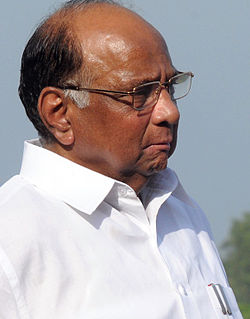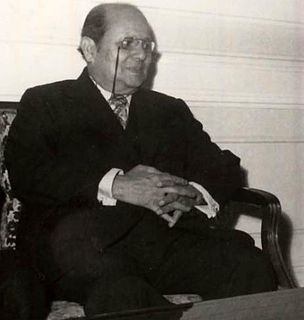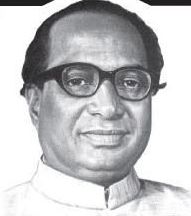This article needs additional citations for verification .(May 2011) (Learn how and when to remove this template message) |
Indian National Congress (Urs) | |
|---|---|
| Secretary-General | A. K. Antony |
| Lok Sabha leader | Sharad Pawar |
| Founder | D. Devaraj Urs |
| Founded | July 1979 |
| Split from | Indian National Congress |
| Colours | Red |
| ECI Status | Dissolved Party [1] |
The Indian National Congress (Urs) was a breakaway faction of the Indira Gandhi-led Congress (I), formed in July 1979 by D. Devaraj Urs, the then Chief Minister of Karnataka. Urs' explanation of the split was the return of Indira's son Sanjay Gandhi into the party fold. Urs took with him many legislators from Karnataka, Kerala, Maharashtra and Goa including future Union Ministers and Chief Ministers, Yashwantrao Chavan, Dev Kant Baruah, Kasu Brahmananda Reddy, A.K. Antony, Sharad Pawar, Sarat Chandra Sinha, Priyaranjan Das Munshi and K.P. Unnikrishnan.

Indira Priyadarshini Gandhi, was an Indian politician, stateswoman and a central figure of the Indian National Congress. She was the first and, to date, the only female Prime Minister of India. Indira Gandhi was the daughter of Jawaharlal Nehru, the first prime minister of India. She served as Prime Minister from January 1966 to March 1977 and again from January 1980 until her assassination in October 1984, making her the second longest-serving Indian Prime Minister, after her father.

D. Devaraj Urs was an Indian politician who served two terms as the eighth Chief Minister of Karnataka, a state in southern India. He entered politics in 1952 and was an MLA for 10 years. When the Indian National Congress split in 1969 as Samstha and Indira Congress, he stood with Indira Gandhi. He became the Chief Minister for the first time from 20 March 1972 to 31 December 1977; later for the second time from 17 March 1978 to 8 June 1980.

Sanjay Gandhi was an Indian politician and the son of Indira Gandhi. He was a family member of the Nehru-Gandhi family. During his lifetime he was widely expected to succeed his mother as head of the Indian National Congress, but following his early death in a plane crash his elder brother Rajiv became their mother's political heir, and succeeded her as Prime Minister of India after her assassination. Sanjay's widow Maneka Gandhi and son Varun Gandhi are leading politicians in the BJP.
Contents
Subsequently Devaraj Urs joined Janata Party; Yashwantrao Chavan, Brahmananda Reddy, and Chidambaram Subramaniam joined Congress (Indira); and A.K. Antony split from Congress (Urs) to form Congress (A) in Kerala. When Sharad Pawar took over the party presidency in October 1981, the name of the party was changed to Indian Congress (Socialist). [2]
The Janata Party was an amalgam of Indian political parties opposed to the Emergency that was imposed between 1975 and 1977 by Prime Minister Indira Gandhi of the Indian National Congress. In the 1977 general election, the party defeated the Congress and Janata leader Morarji Desai became the first non-Congress prime minister in independent modern India's history.
Congress (A) was a political party founded by A. K. Antony when he split from the Indian National Congress (Urs) a splinter group of the Indian National Congress. The party was primarily active in Kerala. The party merged with the Congress(I) in 1982.

Kerala, locally known as Keralam, is a state on the southwestern, Malabar Coast of India. It was formed on 1 November 1956, following passage of the States Reorganisation Act, by combining Malayalam-speaking regions. Spread over 38,863 km2 (15,005 sq mi), Kerala is the twenty-second largest Indian state by area. It is bordered by Karnataka to the north and northeast, Tamil Nadu to the east and south, and the Lakshadweep Sea and Arabian Sea to the west. With 33,387,677 inhabitants as per the 2011 Census, Kerala is the thirteenth-largest Indian state by population. It is divided into 14 districts with the capital being Thiruvananthapuram. Malayalam is the most widely spoken language and is also the official language of the state.










